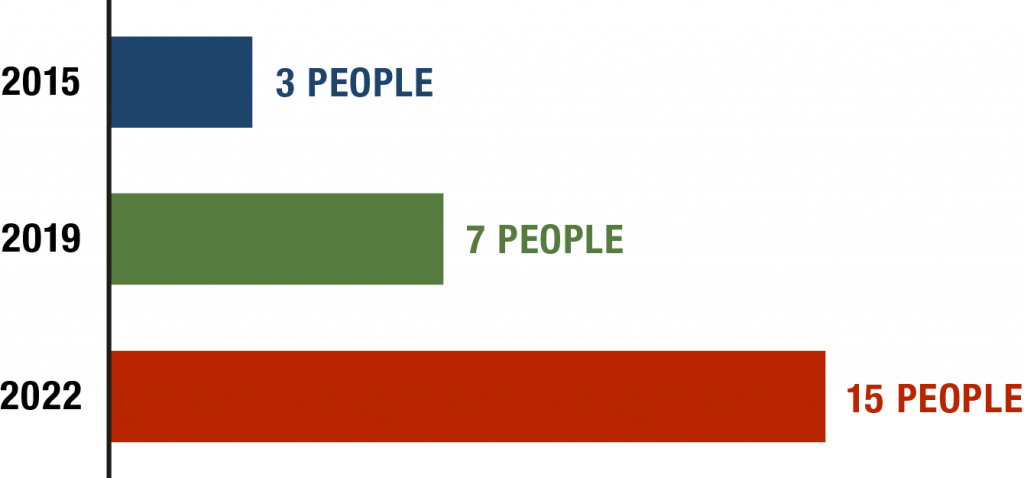Bioleft is a community laboratory that works in the exchange and improvement of open seeds, in order to generate a greater availability of biodiverse and resilient seeds. Since 2016, we have been working in partnership with diverse actors as universities, farmers' organizations, the National Institute of Agricultural Technology (INTA) and with the support of different local and international organisms.
This report seeks to clarify the management of the different resources used by Bioleft from its beginning until today, in line with our transparency policy. The history of Bioleft could be divided into three stages: 1) incubation; 2) experimentation; and 3) pilot and scaling up.

Between its incubation in 2016 and 2022 Bioleft managed a total of U$S 389784 that had come from 8 international and local funding sources. U$S 389.784 que provinieron de 8 fuentes de financiamiento internacionales y locales.
Incubation:
In 2015, a group of researchers from CENIT (Research Center for the Transformation) obtained funding from the International Science Council In 2015, a group of researchers from CENIT (Research Center for the Transformation) obtained funding from the International Science Council (ISC) under the project “Pathways to sustainability”, with the goal of explore these different pathways in diverse contexts, starting from the co-design of Transformation Labs (T-Labs). Argentinian team, based on the debates for the proposals to change the Seed Law, began to generate spaces for multi-stakeholder dialogues, in order to reflect on the problems of the sector and generate innovations that could address these challenges. See more here
The incubation stage, launched in December 2015 and ended in August 2016, when Bioleft name was decided, was funded by the International Science Council (ISC), who contributed with U$S 144.000 (€120.000).
Experimentation::
The experimental stage started in 2016 and ended in early 2019. These three years were funded by the contribution of ISC. This period was highlighted by the creation and development of the first version of the platform, the installation of the experiments in maize and tomato, the creation of the networks of actors, the design and application of open-source licenses, and the institutional strengthening of the project.
Pilot:
This period includes the years from 2019 to the present. During this period, Bioleft engaged in deepening knowledge on participatory breeding, expanding and strengthening its networks, diversifying the functionalities of the platform, fostering capacity building in participatory breeding, increasing the reach of users, testing the social, legal and technological innovations and, among other things, participating in different instances of cross-learning.
Also, Bioleft began to replicate their pilot experience in new contexts, such as Mexico, where during 2019 it worked in partnership with the National Laboratory of Sustainability Sciences (LANCIS) from the National Autonomous University of Mexico (UNAM) to replicate the Bioleft initiative in that country. For tha Global Consortium for Sustainability Outcomes (GCSO) contributed with U$S 10000. See more of the joint work here.
Since 2019, The Conservation Food and Health Foundation Since 2019, The Conservation Food and Health Foundation (CFH) contributed with U$S 30000 annual, that Bioleft managed to renew every July, achieving a total, for all the period, of U$S 120000. In 2023, as a result of the trust generated throughout this time, the foundation contributed US$ 77,000 and for the first time for a period of two years instead of one, thus allowing a greater and better projection of our activities.
Also, in the 2019-2021, the STEPS Centre supported us with £3000 annual, that for all the period were £9000 (if we take an average exchange rate GBP/USD for each year, the amount was U$S 11640). Furthermore, School of Economy and Business (EEYN) from the National University of San Martín Martin (UNSAM) provided us with in-kind financing, by offering not only legal and administrative support, but offices, infrastructure, informatic equipment, the salary of a research assistant and diverse research facilities. Medialab Prado , Madrid, in January 2019, supported the development of Bioleft platform through the invitation to be one of the working projects during the meeting “Eat against the collapse”, that lasted one month. See more here.
Also in 2023, Bioleft was one of the projects selected for FutureEarth 's Pathways Communication Grant, which supports the dissemination of scientific findings from site-based research projects through innovative formats and practices. Bioleft won two grants from Future Earth, each one of €10,000 (a total of U$S 22,000).
Finally, Bioleft received the first Citizen Science grant from the Ministry of Science, Tecnhnology and Innovation in 2023 (approximately U$S 5,144).
Bioleft is also supported by the volunteer work of researchers, technicians, farmers, extensionist, breeders and activists from diverse public institutions and from civil society. This network, that conforms the technical staff of Bioleft have growth from their begginings:

Furthermore, during these years several academic papers and disclosure articles were published, various audiovisual productions were developed, on-site and virtual workshops were held, networks of farmers and breeders were established and supported, and a platform was fully co-developed.